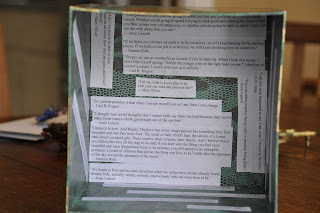I Am Me
"My Declaration of Self-Esteem"
In all the world,
there is no one else exactly like me -
everything that comes out of me is authentically mine,
because I alone choose it - I own everything about me - my body, my feelings, my mouth, my voice, all my actions,
whether they be to others or to myself -
I own my fantasies, my dreams, my hopes, my fears -
I own all my triumphs and successes, all my failures and mistakes. Because I own all of me, I can become intimately acquainted with me - by so doing I can love me and be friendly with me in all my parts -
I know there are aspects about myself that puzzle me,
and other aspects that I do not know -
but as long as I am friendly and loving to myself,
I can courageously and hopefully look for solutions to the puzzles and for ways to find out more about me -
However I look and sound, whatever I say and do,
and whatever I think and feel at a given moment in time is authentically me - If later some parts of how I looked, sounded, thought and felt turned out to be unfitting, I can discard that which I feel is unfitting, keep the rest, and invent something new for that which I discarded -
I can see, hear, feel, think, say, and do.
I have the tools to survive, to be close to others, to be productive,
and to make sense and order out of the world of people and things outside of me -
I own me, and therefore I can engineer me -
I am me &
I AM OKAY
there is no one else exactly like me -
everything that comes out of me is authentically mine,
because I alone choose it - I own everything about me - my body, my feelings, my mouth, my voice, all my actions,
whether they be to others or to myself -
I own my fantasies, my dreams, my hopes, my fears -
I own all my triumphs and successes, all my failures and mistakes. Because I own all of me, I can become intimately acquainted with me - by so doing I can love me and be friendly with me in all my parts -
I know there are aspects about myself that puzzle me,
and other aspects that I do not know -
but as long as I am friendly and loving to myself,
I can courageously and hopefully look for solutions to the puzzles and for ways to find out more about me -
However I look and sound, whatever I say and do,
and whatever I think and feel at a given moment in time is authentically me - If later some parts of how I looked, sounded, thought and felt turned out to be unfitting, I can discard that which I feel is unfitting, keep the rest, and invent something new for that which I discarded -
I can see, hear, feel, think, say, and do.
I have the tools to survive, to be close to others, to be productive,
and to make sense and order out of the world of people and things outside of me -
I own me, and therefore I can engineer me -
I am me &
I AM OKAY
By Virginia Satir



